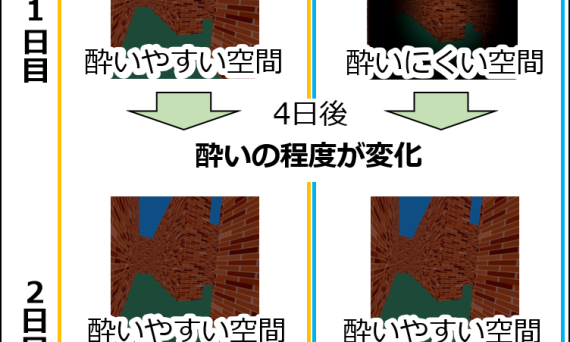VR空間の初期暴露条件がVR酔いの馴化過程に与える影響 / The effect of initial exposure conditions in VR space on habituation process to VR sickness
VR酔いはVRの普及を阻む大きな課題として広く知られている。既存の対策は、視野を制限するなどして酔いを軽減する方法や反復暴露により慣れさせる方法など酔わなくなるという結果を重視するものが主であった。一方で酔いの馴化過程に着目すると、その過程を解明・制御可能になればユーザの体調や「早く慣れたい」などのニーズに合わせた馴化過程をデザインすることができるようになると考えらえる。このため、我々はその初歩としてVR酔いの馴化に影響を与える要因を特定し、その関係性を解明することを目指した。本研究ではVRの初期体験が要因であると考え、初期に暴露されるVR空間の酔い負荷が高いほど、VR酔いは大きく軽減されるという仮説を立て、SSQを用いてこれを検証した。 VR sickness is widely recognized as a major obstacle to the widespread adoption of VR. Existing countermeasures have primarily focused on the result of not getting sick, such as methods that reduce sickness by restricting the field of view or methods that promote habituation through repeated exposure.However, by focusing on the process of habituation to sickness, if we can elucidate and control this process, it may become possible to design habituation processes tailored to the user’s physical condition and needs, such as the desire to “get used to it quickly.”Therefore, as a first step, we aimed to identify the factors that influence habituation to VR sickness and to clarify
